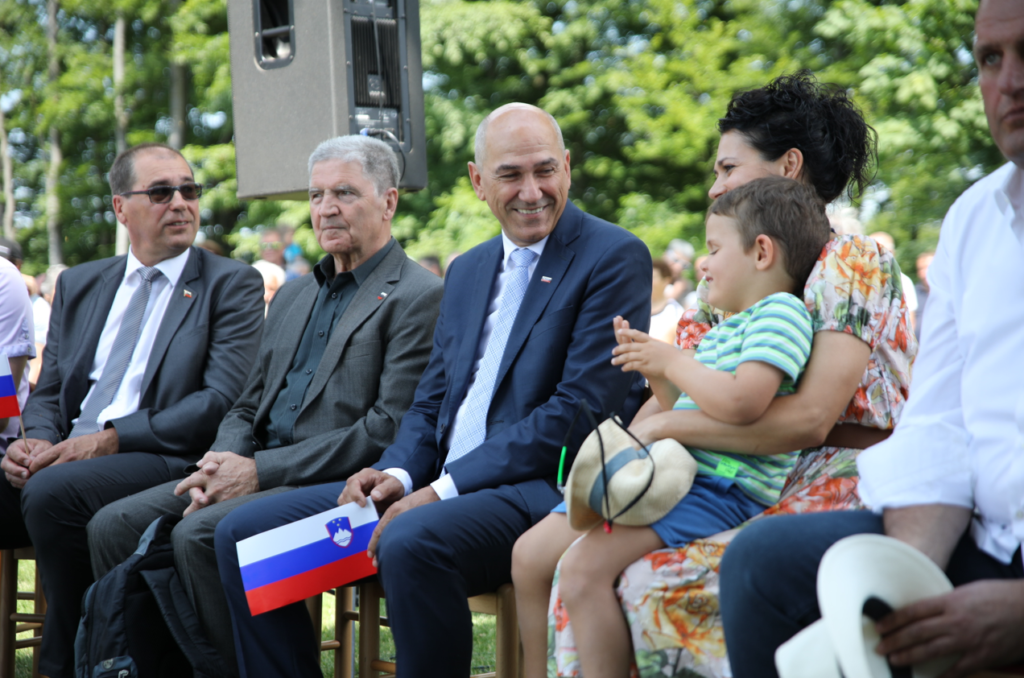A sunny, festive Sunday drew crowds of people to Polževo for the main municipal ceremony to mark Slovenia’s Statehood Day. The celebrations started at 11.00 a.m., with the Mass for the Homeland in the Church of the Holy Spirit, which was celebrated by the priest of the Krka parish, Dejan Pavlin, and the prelate, Dr Janez Gril, and led by professor emeritus, Dr Janez Juhant.
After the Mass for the Homeland, those gathered were addressed by the Member of the National Assembly of the Republic of Slovenia, Janez Janša, who said that the state is to a nation what a house is to a family. The homeland is to a nation what home is to a family. As he said, it is difficult to have a home if you do not have a house or an apartment, and it is difficult to have a homeland if you do not have your own country. Our ancestors, through periods of often very tough history, experienced this first-hand. Janša stressed that a homeland is not something that is created overnight. But a country can emerge almost overnight, and that is what happened 32 years ago. At the same time, he recalled that at that time, the Slovenian Assembly adopted the fundamental, formal acts that put into practice the order given by the Slovenian people in the plebiscite half a year earlier. The plebiscite for an independent Slovenia was practically the only moment in our history when we literally wrote our own judgement. Janša pointed out that this phrase, which was first written by Cankar, had been quoted and misused many times before – but had never been implemented. At the plebiscite for an independent Slovenia, the Slovenian state policy of the time was ordered to prepare everything necessary for the declaration of an independent state capable of living independently. And that actually happened within half a year.
As the President of the Slovenian Democratic Party (Slovenska demokratska stranka – SDS) then added, we are sometimes still surprised today when we look at projects and reconstructions of infrastructure, and not even the plans are drawn up in half a year, and we think that this time is incredibly short – but in fact, it was the most concentrated time in Slovenia’s history. There was a lot going on that was not visible, but it all prepared us for that fateful decision and also for the fateful ordeal that followed almost immediately afterwards because those for whom Slovenia had been a cash cow for decades in many respects were not happy with that decision and reacted badly to it. Thus, aggression came, and Slovenia was attacked, but we successfully defended it. In this slightly longer period of time, the boiling of the Slovenian Spring, the first writers’ constitution, the 57th issue of the Nova revija magazine and everything else that prepared us as a nation for these historic decisions – all this time is remembered as a time when, as sociologists call it, the value centre of the nation was forged.
“We rightly remember this time with pleasure. But this is not the only celebration in Slovenia today. Many people today think that because there are always media-interesting differences, Slovenians are divided every year on Statehood Day, but this is not true. I have received hundreds of invitations to celebrations for the 32nd anniversary of the Slovenian state, there is practically no Slovenian municipality that does not celebrate it, there is no major association that does not commemorate it, I am afraid that the Ljubljana municipality is the only one that does not have a celebration on Slovenian Statehood Day, all 211 other municipalities celebrate it as we do today, cheerfully, unhurriedly, not in such a way as to emphasise the mistakes and the missed opportunities above all – there are other occasions when we can do that. But Slovenian Statehood Day is a day of joy. On that day, we managed to achieve something that no one had managed before, and which hopefully no one will have to achieve again.”
The Mayor’s address
The host of the celebration, Mayor Dušan Strnad, then addressed the citizens, guests, members of the Parliament of the Republic of Slovenia, honorary citizens, ambassadors of the municipality, and the President of the Slovenian Beekeepers’ Association Boštjan Noč on the occasion of Statehood Day, and thanked those gathered for the fact that for the 21st year in a row, some of them had come in large numbers to the Church of the Holy Spirit on the top of Polževo and prayed for their homeland. In his address, he also thanked the co-organiser of the event, the Ivančna Gorica Municipal Tourist Board, which has been involved in organising this type of event in the municipality of Ivančna Gorica and the Krka parish since the beginning. He also thanked Blaž Miklavčič and some other good people who have taken care of the church and its surroundings at the top of Polževo for a long time now, to make it a paradise on earth. On behalf of the organisers, the new Honorary Citizen of Ivančna Gorica, Pavel Groznik, thanked the guests with a modest gift.
Members of the Slovenian Octet (Slovenski oktet) enriched the event with their singing during the mass and in the cultural part of the programme, while members of the Krka Cultural Society joined in with recitations, as well as dance items to the sound of the accordion and singing by the Zajc family. The guests were taken to the top of Polževo in carriages by members of the Friends of the Horses Višnja Gora Association, and this year the traditional goulash was provided by the firefighters of the Kriška vas Fire Brigade. The event was moderated by a member of the Cultural Association Krka, Anica Kozinc.
Sara Kovač


